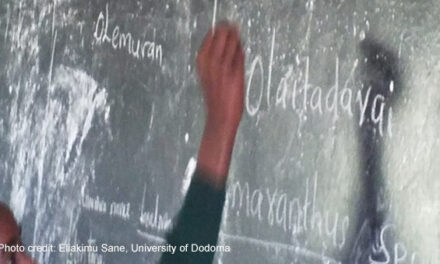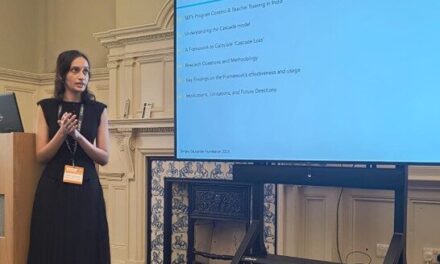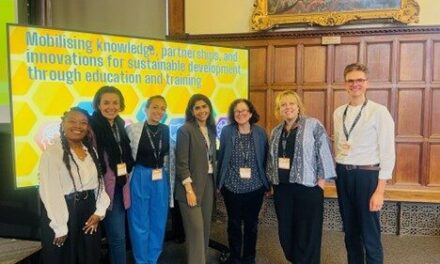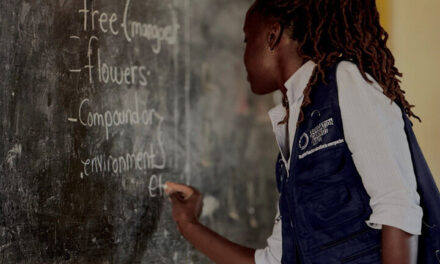Highlights from theme convenors of one of seven UKFIET 2025 conference themes, ‘Climate and environmental justice’: Rachel Wilder, University of Bath, and Fernanda Gándara, Room to Read.
What excites you about your theme?
The Climate and Environmental Justice sessions reflect diverse ways of knowing, doing and researching education. This excites us because we see potential for a burgeoning flurry of ‘aha’ moments, unexpected connections, and also quiet, resonating pauses. Most of our presenters come from the most climate-affected regions in the world, including Sub-Saharan Africa, South Asia, Southeast Asia and Latin America. Throughout the programme, there is an ask – sometimes understated and often loud and with urgency – to listen and involve those people living at the sharp end of climate crises in building a better world. While climate and environmental justice is the starting point, this isn’t only about building more climate-resilient education systems and delivering climate action through education. Our theme reconsiders education as a vital cultural and social institution that has at its heart a fundamental concern with peaceful, caring and just relations among people and the more-than-human.
We are incredibly delighted to be leading the Climate and Environmental Justice sub-theme at the UKFIET 2025 conference and feel confident there is something here for everyone.
How does this link to the overall 2025 conference theme and global landscape?
The Climate and Environmental Justice theme is extremely important, especially in a political environment where the climate crisis is being de-emphasised. Environmental disasters, violent conflicts and international migration are having devastating effects on many lives and communities, and at the same time are seen to be an increasing threat to those who heretofore have believed themselves to be safe from global turbulence and instability. National security – narrowly understood – is being prioritised over global solidarity, and accordingly, climate and foreign aid are being defunded. We strongly believe that this topic deserves more attention and collective deliberation than ever before.
At an early planning meeting for the UKFIET 2025 conference, the team of all theme convenors – together with our fantastic overall chairs, Emma Sarton and Fran Salvi – began to unpack how the conference theme was meaningful for each of our topics. What is ‘innovation’? Whose, or what kinds of knowledge are we drawing from? ‘Sustainable development’, ‘transformative potential’, ‘resilient learning communities’… So many contested and contestable terms! There were many ways the conference theme could be understood and applied, which created freedom as well as complexity in our task. Months later, we see how these have manifested in our programme.
Mobilising knowledge is about movement, uncertainty and displaced hierarchies of who knows and what type of knowledge can help in each particular context. This is perhaps inherent to climate and environmental justice, where it might be less obvious in other themes. Forced and voluntary mobility is essential to survival in contexts of immense disruption, and in these contexts, localised knowledge systems often take the seat of honour. Where solutions to climate change are often critiqued for being overly technological, here, innovation is low-tech: it is humility, it is an effort to correct epistemic injustices by opening up ways of thinking and doing to consider ‘what if?’. Innovation is found in looking forward and outward to anticipate and take action for alternative futures. There is a clear call by many of our presenters to unlearn staid practices and to seek unlikely partners: climate scientists and funders, children and girls, the very trees, rivers and lands that surround us. And a reminder that teachers and education practitioners are always at the front lines, they know our children – their worries, their talents, their hopes and desires – and they must always be our partners in re-imagining education.
What kind of sessions/ papers can we expect to find under your theme?
Our theme offers unique diversity in ‘how’ to engage with learning and reflection. The epistemological diversity of the sessions in the Climate and Environmental Justice themes is truly remarkable.
Creative sessions include an invitation back to childhood – exploring how natural materials can bring communities together to design greener futures – and a Decolonial Cafe that calls on us to examine and un-learn how we come to know, with a view to re-forming our research values in more relational and caring ways. Papers unveil empirical research on how the climate crisis has transformed relationships between human communities and the bodies of water with whom they co-exist; they address how our interpretations and applications of justice become embedded in structural conditions that may enable or hinder climate resilient education systems; and they explore connections between knowing and doing – with a critical lens on who is knowing, who is doing – and how justice is accordingly implicated in solutions.
Finally, the programme includes a Conversations for Change luncheon about justice-oriented approaches to measuring climate, environmental and ‘green’ education. This opportunity begins online on Monday, 1 September – two weeks ahead of the conference – for some light-touch knowledge exchange and discussion, to enable people anywhere in the world to be heard and involved.




